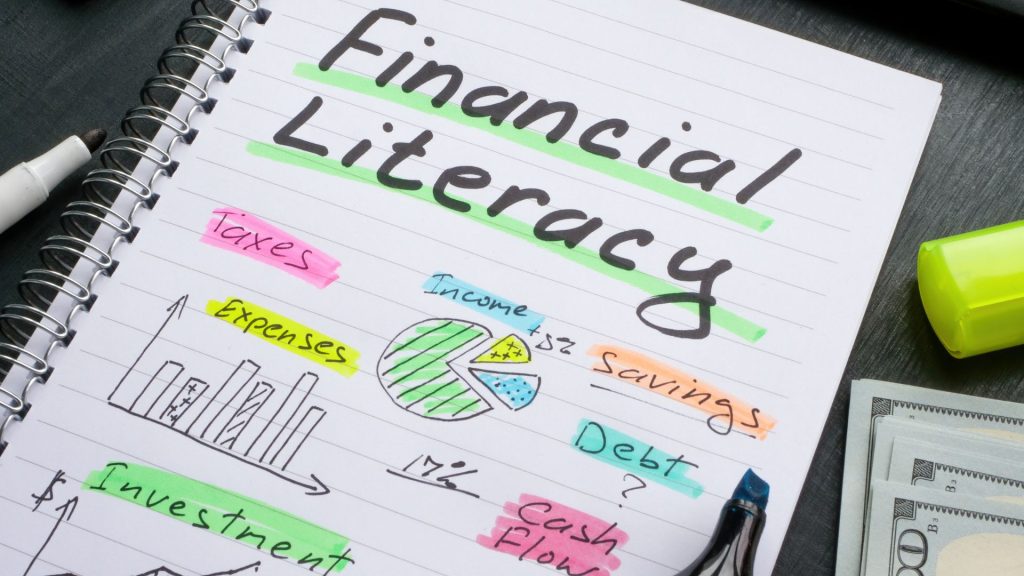
Table of Contents
Best Online Courses for Personal Finance Education
Best Online Courses for Personal Finance Education: Personal finance is one of the most important life skills, yet it is rarely taught in schools. Many people enter adulthood without a clear understanding of how to manage money, build wealth, or plan for the future. The result is often years of financial stress, debt, and missed opportunities. Fortunately, the rise of digital learning has made financial education more accessible than ever. Today, countless online platforms offer high-quality courses designed to help individuals of all ages and backgrounds improve their financial literacy. By enrolling in the right courses, you can learn everything from budgeting and saving to investing and retirement planning.
This guide explores the best online courses for personal finance education, the skills they can teach you, and how they can change your financial future.

Why Online Personal Finance Courses Matter
Financial education empowers people to make smarter decisions about their money. Without knowledge, it is easy to fall into common traps such as overspending, accumulating high-interest debt, or delaying retirement savings. Online personal finance courses matter because they fill this educational gap by providing structured, expert-led lessons.
Unlike trial-and-error approaches to learning about money, courses offer clear frameworks and strategies that you can apply in your daily life. They also save time, condensing years of experience into digestible lessons. With online courses, you have the flexibility to learn at your own pace, revisit materials when needed, and access knowledge from leading financial experts around the world.
The Rise of Digital Learning for Finance
The digital age has revolutionized the way people learn. Instead of needing to attend in-person classes or seminars, learners can now access top-tier financial education from the comfort of their homes. Online platforms provide a diverse range of options, from beginner-friendly courses for those just starting their financial journey to advanced programs for those interested in investing, real estate, or entrepreneurship.
What makes digital learning especially powerful for personal finance is its accessibility. Many courses are affordable or even free, allowing anyone with internet access to start their financial education journey. In addition, most platforms provide interactive tools, videos, quizzes, and even community groups where learners can share their experiences.
Core Topics Covered in Personal Finance Courses
The best online personal finance courses cover a wide range of topics essential for building financial confidence. Many start with the fundamentals such as budgeting, saving, and understanding credit. Learners are taught how to create a spending plan, manage expenses, and prioritize financial goals.
As you progress, courses often expand into areas like debt management, investing, and retirement planning. Some programs include modules on taxes, insurance, and estate planning, ensuring a well-rounded education. Others focus on specific topics like real estate investing, stock market basics, or small business finance. By covering such a comprehensive range of subjects, these courses ensure that learners are prepared for both everyday financial challenges and long-term planning.

Best Online Courses for Budgeting and Saving
For beginners, courses that teach budgeting and saving form the foundation of financial literacy. These classes often walk learners through the process of tracking income and expenses, identifying areas of overspending, and creating a sustainable budget. Many also highlight the importance of emergency funds and the role of short-term and long-term savings.
Such courses are particularly useful for young adults, college students, or anyone who has struggled to get their finances under control. By mastering these basics, learners can establish healthy financial habits that support their goals for years to come.
Best Courses for Debt Management
Debt is a significant challenge for many people, and online courses dedicated to debt management are invaluable. These programs explore the different types of debt, such as student loans, credit cards, and mortgages, while teaching strategies to pay them down effectively. Learners are introduced to concepts such as snowball and avalanche repayment methods, as well as techniques for negotiating lower interest rates.
What sets these courses apart is their emphasis on long-term behavior change. Rather than simply eliminating debt, they focus on helping students avoid falling back into old habits by fostering financial discipline and planning skills.
Investing Courses for Beginners
One of the most popular categories of online personal finance education is investing. Many people understand the importance of investing but feel intimidated by the complexity of financial markets. Online courses simplify these concepts, breaking down topics like stocks, bonds, mutual funds, exchange-traded funds, and real estate.
Beginner-friendly courses provide step-by-step guidance on how to start investing with small amounts, how to assess risk, and how to build a diversified portfolio. Some even simulate investment scenarios, allowing learners to practice without using real money. For those who have always wanted to participate in the stock market but didn’t know where to start, these courses offer the perfect introduction.

Advanced Investing and Wealth-Building Programs
For learners who already understand the basics, advanced investing courses go deeper into wealth-building strategies. These programs might cover technical analysis, real estate investing, options trading, or retirement account optimization. They are typically geared toward individuals who are ready to take greater control of their financial future and explore strategies beyond simple saving and index fund investing.
The value of advanced courses lies in their ability to provide specialized knowledge that can generate long-term wealth. Learners gain insights into how markets function, how to evaluate investment opportunities, and how to create strategies that align with their personal risk tolerance.
Retirement Planning Courses
Retirement planning is another critical area covered by many online personal finance courses. These programs teach learners how to calculate retirement needs, understand different types of retirement accounts, and create a savings strategy that ensures financial independence later in life.
Retirement courses often emphasize the importance of starting early and making consistent contributions. They also explore how to balance retirement savings with other financial goals such as buying a home, paying off debt, or funding education. By completing such courses, learners gain confidence in their ability to retire comfortably.
Courses for Entrepreneurs and Small Business Owners
Entrepreneurship is on the rise, and many online finance courses now cater specifically to business owners and freelancers. These courses focus on topics such as business budgeting, cash flow management, taxes, and reinvestment strategies. They provide tools for separating personal and business finances, ensuring that entrepreneurs not only succeed in business but also protect their personal wealth.
For small business owners, these courses are especially valuable because they blend personal finance with professional growth, helping learners achieve stability in both areas of life.
Personal Finance Courses for Families
Another emerging category is courses designed for families and parents. These programs cover not only traditional financial topics but also strategies for teaching children about money. Parents learn how to set up college savings plans, budget for household expenses, and create financial goals as a family unit.
Family-focused courses emphasize teamwork, communication, and shared responsibility. They highlight the importance of involving children in age-appropriate financial discussions to build generational wealth and financial literacy.
Accessibility and Flexibility of Online Courses
What makes online personal finance courses so appealing is their accessibility and flexibility. Unlike traditional classrooms, online learning allows you to study at your own pace. Busy professionals, stay-at-home parents, and students can all fit lessons into their schedules without disrupting daily routines.
In addition, many courses offer lifetime access, meaning you can revisit the material whenever you want. This is especially useful for financial topics, as learners often need reminders or updates as their circumstances change. Whether you want to refresh your budgeting skills or explore new investment strategies, having access to course content at any time is a significant advantage.
The Role of Certification
Some personal finance courses provide certificates upon completion. While certifications are not always necessary for personal use, they can be valuable for professionals who want to demonstrate financial literacy in their careers. Employers, especially in fields like business, education, or social services, often view financial education as a useful skill.
Certification can also serve as personal motivation. Completing a course with a certificate gives learners a tangible achievement that symbolizes their commitment to financial growth.
The Cost of Online Personal Finance Courses
Online courses vary widely in price. Some are free, while others may cost hundreds of dollars depending on the platform and instructor. The key is to view these courses as investments in your future. A well-designed program that teaches you how to save money, reduce debt, or build wealth will often pay for itself many times over.
Many platforms also provide financial aid or subscription models, making them more affordable. Learners should evaluate the value of a course not only by its price but by the quality of instruction, the comprehensiveness of the curriculum, and the potential long-term benefits.
Community and Support
One often-overlooked benefit of online courses is the community aspect. Many platforms host discussion boards, group projects, or live Q&A sessions where learners can interact with instructors and fellow students. This sense of community fosters accountability and support, making it easier to stay motivated and apply what you learn in real life.
Being part of a learning community also helps reduce the feeling of isolation that often accompanies financial struggles. Sharing experiences and solutions with others builds confidence and provides valuable perspectives.
Choosing the Right Course for You
With so many options available, choosing the right personal finance course can feel overwhelming. The key is to start by identifying your financial goals. If you’re struggling with daily money management, a beginner budgeting course might be ideal. If you’re curious about investing, an introductory stock market class would be a good fit. For those planning for retirement, specialized courses in long-term savings strategies may be best.
When choosing a course, consider the reputation of the platform, the qualifications of the instructor, and the reviews from past students. A well-reviewed course with clear, structured content will provide better results than a program that feels vague or overly complicated.
Building Financial Confidence
Ultimately, the true value of online personal finance courses lies in the confidence they provide. Many people avoid dealing with money because they feel overwhelmed or ashamed of their lack of knowledge. By completing a structured course, learners not only gain practical skills but also develop the confidence to take control of their financial lives.
This confidence translates into real-world results, such as paying off debt, saving for a home, or investing for the future. With each milestone achieved, learners gain momentum and motivation to continue their financial journey.
Lifelong Learning in Personal Finance
Personal finance is not a one-time subject but a lifelong learning process. As markets, technologies, and personal circumstances change, so do financial strategies. Online courses play a critical role in lifelong learning, allowing individuals to continuously update their knowledge and adapt to new realities.
Whether it’s learning about emerging investment trends, understanding changes in tax laws, or exploring tools for digital budgeting, ongoing education ensures that you remain financially resilient.
Final Thoughts
The best online courses for personal finance education provide more than just knowledge. They offer tools, strategies, and confidence to navigate a complex financial world. From budgeting basics to advanced investing strategies, these programs make financial literacy accessible to anyone willing to learn.
By choosing the right course, you are not just improving your understanding of money—you are making a commitment to your financial future. Whether you are a beginner taking your first steps or an experienced professional seeking to refine your strategy, online courses can help you unlock financial freedom.
Personal finance is one of the few subjects that directly impacts every aspect of life. The time and resources you invest in financial education today will pay dividends for years to come, ensuring that you are prepared not just for the challenges of today, but for the opportunities of tomorrow.
Also visit:-
10 Simple Ways to Bring Romance Back into Your Marriage
FAQs on Best Online Courses for Personal Finance Education
Q1. What are personal finance courses?
Personal finance courses are structured lessons that teach essential money management skills, including budgeting, saving, investing, and retirement planning.
Q2. Why should I take an online personal finance course?
Online courses provide flexibility, expert instruction, and practical strategies that help you make smarter financial decisions at your own pace.
Q3. Are online personal finance courses suitable for beginners?
Yes, many courses are designed specifically for beginners with no prior knowledge of finance.
Q4. What topics do online personal finance courses usually cover?
They often cover budgeting, debt management, credit building, investing, retirement planning, taxes, and insurance.
Q5. How can online courses improve my financial literacy?
Courses provide step-by-step guidance, real-world examples, and tools that make financial concepts easy to understand and apply.
Q6. Are there free online courses for personal finance?
Yes, several platforms offer free courses that cover budgeting, saving, and financial planning basics.
Q7. Which online platforms are popular for personal finance education?
Popular platforms include Coursera, Udemy, edX, Skillshare, and Khan Academy.
Q8. Can an online course help me get out of debt?
Yes, many courses provide proven strategies for debt repayment and building healthier financial habits.
Q9. Do personal finance courses teach about credit scores?
Most beginner courses cover how credit works, the importance of credit scores, and tips for improving them.
Q10. Can online courses help me start investing?
Yes, many courses provide beginner-friendly guides to investing in stocks, bonds, mutual funds, and ETFs.
Q11. Are online personal finance courses self-paced?
Most courses are self-paced, allowing you to learn at your own convenience.
Q12. Do personal finance courses provide certificates?
Some platforms offer certificates of completion, which can be valuable for professional development.
Q13. Are online personal finance courses interactive?
Many include quizzes, assignments, and discussion forums to enhance the learning experience.
Q14. Can families benefit from online financial education?
Yes, there are courses designed for parents and families that cover budgeting, saving, and teaching kids about money.
Q15. Do personal finance courses teach retirement planning?
Yes, retirement planning is a key module in many courses, teaching you how to save and invest for the future.
Q16. How long does it take to complete an online personal finance course?
The length varies; some can be completed in a few hours, while others span several weeks.
Q17. Are online courses better than reading books about finance?
Courses often provide more interactive learning with step-by-step explanations and visual aids, making them easier to understand.
Q18. Can personal finance courses help small business owners?
Yes, some courses are tailored for entrepreneurs, focusing on cash flow management, taxes, and separating business and personal finances.
Q19. Are these courses updated regularly?
Reputable platforms update content to reflect changes in financial laws, tools, and strategies.
Q20. How much do online personal finance courses cost?
They range from free to several hundred dollars, depending on the platform and depth of the material.
Q21. Do personal finance courses cover real estate investing?
Some advanced programs include modules on real estate as a wealth-building strategy.
Q22. Are there online courses specifically for college students?
Yes, many beginner-friendly courses are designed for young adults managing money for the first time.
Q23. Can online courses help me save more money?
Absolutely. Budgeting and saving courses provide practical tools to reduce spending and build savings.
Q24. Do personal finance courses explain taxes?
Many cover basic tax principles, helping you understand deductions, filing, and planning strategies.
Q25. Are courses accessible on mobile devices?
Yes, most platforms provide mobile apps or responsive websites for learning on the go.
Q26. Do personal finance courses offer lifetime access?
Some platforms allow lifetime access, so you can revisit the material whenever needed.
Q27. Can I learn financial goal setting in online courses?
Yes, courses often start with goal setting and help you create actionable financial plans.
Q28. Are there specialized courses for women in finance?
Yes, some platforms offer programs tailored to women’s financial challenges and goals.
Q29. Do online courses include investment risk education?
Yes, investing modules typically explain risk tolerance and portfolio diversification.
Q30. Can I teach my kids about money using what I learn in these courses?
Yes, many parents use course knowledge to teach children financial basics at home.
Q31. Are there personal finance courses focused on digital tools and apps?
Yes, some programs teach you how to use budgeting apps, robo-advisors, and fintech tools.
Q32. Do courses help in preparing for emergencies?
Yes, they explain how to build emergency funds and plan for financial security.
Q33. Can I get personalized advice through online courses?
Some courses offer mentorship, Q&A sessions, or access to financial coaches.
Q34. Are personal finance courses worth the investment?
Yes, the skills and strategies learned often save or earn you far more than the course fee.
Q35. Do personal finance courses cover insurance planning?
Yes, many provide an overview of health, life, auto, and home insurance.
Q36. Can I access online courses internationally?
Yes, most platforms are global and accessible from anywhere with internet.
Q37. Do online finance courses require prior knowledge?
Most beginner courses do not require any financial background.
Q38. Can I learn wealth-building strategies through online courses?
Yes, advanced programs cover long-term wealth-building through investing and smart planning.
Q39. How do I choose the right personal finance course?
You should consider your current financial goals, platform reputation, and instructor expertise.
Q40. What is the biggest benefit of taking online personal finance courses?
The biggest benefit is gaining financial confidence and practical skills to manage money effectively for life.
Also visit:-



